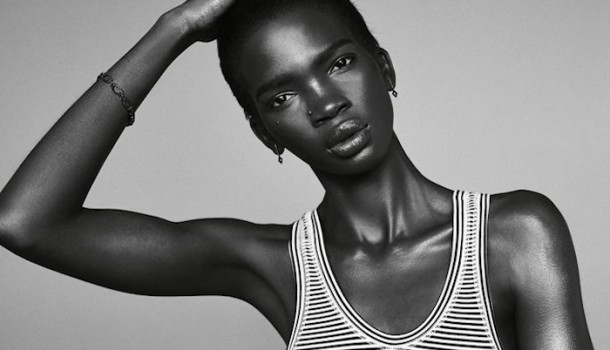Despite a better diversified audience of models and designers at this year’s New York Fashion Week (plus a stellar symbol of hope presented by Zac Posen urging that Black Models Matter) , racism still showed its ugly head last week after malicious comments were posted under MAC Cosmetic’s post of a close- up of model Aamito Lagum‘s lips backstage at Ohne Titel at New York Fashion Week.
Aamie Stacie Lagum is no new face to the fashion industry: she won the first Africa’s Next Top Model and has since walked the catwalks for Lacoste, Marc by Marc Jacobs, Rag & Bone, Lanvin, Giambattista Valli and Hermes. In 2014, she also became the first woman of color to open the show for Balenciaga (opening again in 2015), proving that she definitely is making waves for women of color in and out of the fashion industry. However, it would be MAC Cosmetic’s posting of her lips on their Instagram account that would send the world up in flames, with people taking to the platform to vocalize their discontent. Below is an excerpt from one such comment:

The comment reads, “Black women will never be as beautiful as white women. The only argument blacks have is they have more melanin like that matters [crying emoji]. Yes white women can get injections and when they do, they are basically flawless. You don’t have any thing [sic] over them anymore and thats [sic] why you get so pissed off. Keep lying to yourselves thinking your dark asses look better. [crying emojis]. dont [sic] even come at me with the ‘all white features were first started by blacks’ Even if that was true, WHERE THEY AT THO? [100 emoji] Keep projecting your jealousy on white women though, Id [sic] rather be a cracker with injections than look like the majority of you oily yet ashy at the same time people. Acting like you don’t bleach your skins, get nosejobs, get contacts, and dye your hair blonde. [crying emoji, wave emoji].” Aamito took to her personal Instagram to politely clap back at all the haters of the photo, letting them know that even their rude comments were still making the post gain attention. While we can applaud the level of maturity she took in tackling the issue, it raises huge questions on what exactly needs to be done as we continue to fight for relevancy and respect in an industry that has not been created to cater to our needs. Those that attacked Lagum never even addressed the actual lipstick she was wearing, but instead chose to focus on her lips.
Aamito took to her personal Instagram to politely clap back at all the haters of the photo, letting them know that even their rude comments were still making the post gain attention. While we can applaud the level of maturity she took in tackling the issue, it raises huge questions on what exactly needs to be done as we continue to fight for relevancy and respect in an industry that has not been created to cater to our needs. Those that attacked Lagum never even addressed the actual lipstick she was wearing, but instead chose to focus on her lips. Even seven years ago, it was estimated that Black women alone spent nearly $7.5 billion dollars annually on beauty products, but shell out 80 percent more money on cosmetics and twice as much on skin care products than the general market. Since then, we can only imagine that the numbers have continued to grow, yet it begs the question: What do we do with our buying power in situations like this?
Even seven years ago, it was estimated that Black women alone spent nearly $7.5 billion dollars annually on beauty products, but shell out 80 percent more money on cosmetics and twice as much on skin care products than the general market. Since then, we can only imagine that the numbers have continued to grow, yet it begs the question: What do we do with our buying power in situations like this?
In an official statement, Mac said “M·A·C stands for and respects All Ages, All Races, All Sexes. We do not tolerate any abusive comments in our community.”
It is a shame that in 2016, we are still fighting cyber bullying, lack of diversification and blatant racism. Yet, the real question remains: What next? What do we do, or what needs to be done moving forward with beauty brands and models of color? How do we as a people effect change while utilizing our spending power?



